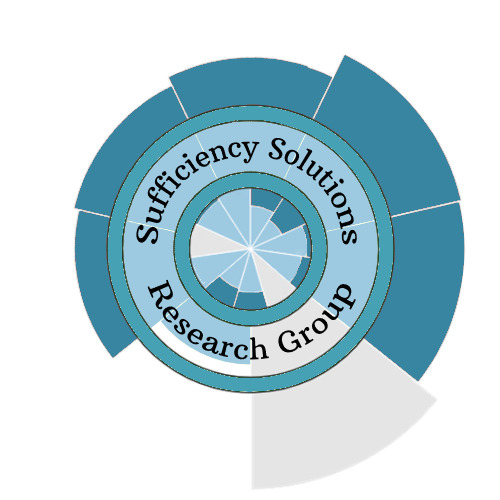
Sufficiency Solutions Research Group
Leaders
The Sufficiency Solutions Research Group focuses on the challenge of achieving sustainable well-being equitably while respecting planetary boundaries. The unifying concept of the group is sufficiency, from which solutions are derived for building a sustainable, secure and happy life.
Key research areas
The group’s core research topics include the concept of sufficiency and sufficiency solutions implemented across various sectors. Additionally, the research covers sustainability transformation, ecological restoration, ecosystem services, ecological macroeconomics, growth dependence or addiction, degrowth, post-growth or steady-state economy, and well-being economy, among other subjects.
Through research and interaction, the group aims to better understand how well-being can be ensured independently of economic growth, equitably, while maintaining the economy’s material and energy throughput within planetary boundaries. The group strongly leans on the theoretical background of ecological economics.
Interdisciplinary approach
The group is phenomenon-oriented and thus integrates expertise from many fields. Solving today’s complex problems requires combining insights and tools from natural sciences, social sciences, humanities, and arts. Therefore, our research group welcomes researchers from various backgrounds interested in these critical topics.
Purpose
The group strives to produce high-quality science to understand solutions to ongoing sustainability challenges. By generating policy recommendations that support sustainable well-being across different levels and sectors, the group also aims to translate scientific knowledge into concrete changes towards a sustainable future.
Current members:
- Teemu Koskimäki — Ecological macroeconomics and sufficiency (UEF).
- Myele Rouxel — Ecological law and post-growth (UEF).
- Rasmus Sihvonen — Social pedagogy and dialogue (UEF).
- Taina de Carvalho — Social pedagogy and arts (UEF).
- Milla Sarja — Corporate Environmental Management (JYU).
- Anni Marttinen — Wellbeing economics and governance (UEF).
- Heli Turtinen — Ecological economics and wellbeing indicators (UEF).
- Topi-Matti Heikkola — Environmental and resource economics, environmental movements (UEF).
Former members:
- Matleena Käppi — Social-ecological economics (WU, LUT).
- Mihails Cugunovs — Ecosystem services and nature restoration (UEF)
Funded projects (latest first):
- Sustainable wellbeing indicators in ecological macroeconomic models. 2024-2027. Funded by the Kone Foundation.
- Modeling Sufficiency Solutions in the Sustainability Transition. 2024-2028. Funded by the Kone Foundation.
- Sustainability Transformations Doctoral Education Pilot (SUSTRA). 2024-2027. Funded by the Ministry of Education and Culture, the Research Council of Finland, and the Nessling Foundation.
- Pressure Points in the Sustainability Transition: Law and Economics as Enablers of Sustainable Wellbeing (KATKO). 2023-2028. Funded by the Saastamoinen Foundation.
- Sufficiency solutions for a resilient, green, and just Finland (SISU). 2023-2029. Funded by the Strategic Research Council of Finland (SRC). Consortium: UEF, LUT, UTU, XAMK, DEMOS
Logo: Based on the ’world doughnut’ chart from 2015. Source of the chart: goodlife.leeds.ac.uk
Keywords
Leaders
Doctoral Researchers
-

Myele Rouxel
Doctoral ResearcherLaw School, Faculty of Social Sciences and Business Studies -

Rasmus Sihvonen
Doctoral ResearcherDepartment of Social Sciences, Faculty of Social Sciences and Business Studies -

Heli Turtinen
Doctoral ResearcherDepartment of Social Sciences, Faculty of Social Sciences and Business Studies


